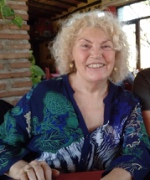Magic Melilla and Ceuta: Two Spanish Cities in North Africa

The tiny Spanish enclaves of Ceuta, 18 km, and Melilla, 12 km, lie on the northern shores of Morocco’s Mediterranean coast located between two continents, facing Andalucia. Different cultures meet in Melilla and Ceuta giving them an exoticism that makes them different from other Spanish cities. They are interesting for us also for several other reasons. For centuries different cultures have conquered them and left their footsteps, from the Phoenicians to the Spanish. In the 15thc Melilla became Spanish, Ceuta in the 17thc. They share a very large part of their history with Spain, especially with Andalucia.
The cities are home to four cultures, Christian, Muslim, Jewish and Hindu, that all live peacefully together. Melilla has the greatest collection of Modernist buildings apart from Barcelona. Together they form the European Union’s only land borders with Africa and the fences are very often in the news. Last but not least they are cities claimed by two countries as Morocco does not recognize them as Spanish.
Join Helen in this lecture on a quest from the mythical Ceuta which is said to be one of the Pillars of Hercules, to the underground tunnels in Melilla, to the many gorgeous Modernist buildings, to the controversial fences of both enclaves, to the churches, synagogues, mosques and Hindu temples.
About the Lecturer
 Helen Sijsling has been living in Spain for 20 years. Having read English Literature at Leyden University and Oxford University she worked as a teacher of English. After having attained an MA in Educational Management at the University of Amsterdam she worked in The Netherlands and the Caribbean as educational consultant for secondary schools, training managers in change management and teachers in new and effective ways to teach.
Helen Sijsling has been living in Spain for 20 years. Having read English Literature at Leyden University and Oxford University she worked as a teacher of English. After having attained an MA in Educational Management at the University of Amsterdam she worked in The Netherlands and the Caribbean as educational consultant for secondary schools, training managers in change management and teachers in new and effective ways to teach.
Now there is time to thoroughly enjoy other interests expressed in an earlier degree in History of Art (Leyden University) and she regularly gives lectures on History, Literature and Art subjects for The Arts Societies and other societies on the coast.
